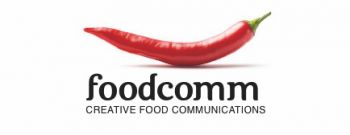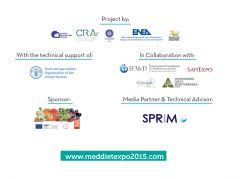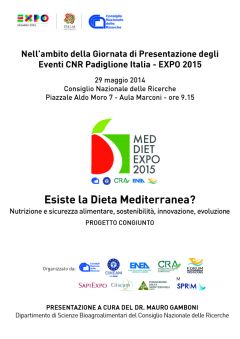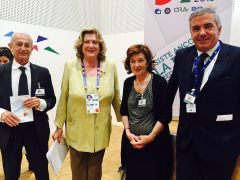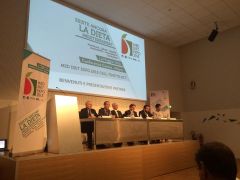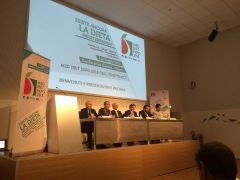A CONTRIBUTION TO THE CHARTER OF MILAN
TOWARDS MORE SUSTAINABLE FOOD SYSTEMS
FOR PRESENT AND FUTURE GENERATIONS
14 May 2015
AWARE OF
The role of CIHEAM in promoting the Mediterranean Diet through its activities in the field of education, research, networking of decision makers and experts, and technical assistance for the development of agriculture, territories, and food security in the Mediterranean;
HAVING REGARD TO
At the 3rd CIHEAM ministerial meeting, held in 2001, in Athens, the Ministers of the 13 Members Countries of CIHEAM highlighted the importance of promoting the Mediterranean diet as an instrument for the development of Mediterranean countries;
At the 7th CIHEAM ministerial meeting held in 2008, in Zaragoza , in order to support and share the nomination of the Mediterranean diet as intangible heritage of humanity by UNESCO, the following statement was signed by the 13 Ministers and their delegates: “…being an extraordinary intangible cultural heritage that unites and identifies us, and for its strategic importance at social, territorial, environmental, landscape, economic, productive and healthy levels, the CIHEAM member countries support the proposed nomination, so that the UNESCO may recognize the Mediterranean diet as Intangible Cultural Heritage of Humanity”;
At the 8th CIHEAM ministerial meeting, held in 2010, in Istanbul, it was recommended ”to work to promote a healthy and sustainable regional food production system following the standards of the Mediterranean diet that foster the spirit of conviviality and favour consumption of local and seasonal products, particularly by encouraging regional networks to support public decisions for the protection, promotion and marketing of Mediterranean products and the development of environmentally sound agricultural production systems”; and then at the 5th Session of UNESCO's Intergovernmental Committee, held in 2010, in Nairobi, the Mediterranean Diet was included in the Representative List of Intangible Cultural Heritage of Humanity;
At its 9th CIHEAM ministerial meeting, held in Malta, in 2012, the role of the Mediterranean diet was underlined “as a driver of sustainable food systems within the strategies of regional development and on that of traditional local products, since quantitative food security must also be complemented by qualitative approaches”;
At its last 10th CIHEAM ministerial meeting, held in Algeria, in 2014, recommended the sharing of national concerns, information and national experience in the field of food security, and such exercise might involve projects on sustainable development in the rural environment, sustainable food systems, development and promotion of quality products or the Mediterranean diet;
At the last Euro-Mediterranean Conference on Agriculture, held in Palermo, in 2014, it was requested to the countries “To commit themselves towards a stronger sustainability of agrofood systems for the benefit of all citizens and of the youth, in particular by highlighting the benefits of the Mediterranean diet for the local and regional development”;
RECOGNIZING
The progress made since the Euro-Mediterranean Ministerial Conference on Agriculture held in Venice in 2003 which has contributed to the strengthening of agricultural, food and rural cooperation between EU member states and Mediterranean partner countries and to the promotion of the regional dialogue on matters related to this sector crucial for the economies and societies of the Mediterranean basin.
AWARE
Currently the traditional Mediterranean diet has been abandoned in many Mediterranean countries and current food consumption patterns are not sustainable in the Mediterranean region. Despite its well documented healthy benefits, the Mediterranean diet is passing through an erosion of its cultural heritage as well as through a “nutritional transition” in which problems of undernutrition coexist with overweight, obesity and food-related chronic diseases.
Considering that most current agro-food systems are not sustainable due to loss of biodiversity, natural resources degradation, climate change, high energy input, erosion of the consumption food patterns, urgent measures are needed in both industrialized and in developing countries.
The sustainability of food consumption and production has emerged on the food security and nutrition international policy debate in recent years. The international momentum of the 2015 Expo of Milan is foreseen for the CIHEAM as an opportunity, through the launching of this Med Diet EXPO Call, to further stimulate this debate in the Mediterranean region and beyond and to move towards more sustainable Mediterranean food systems as concrete actions for the enhancement of the Mediterranean diet as a sustainable dietary pattern.
The Mediterranean diet, foreseen as a driver for the improvement of the sustainability of food consumption and production in the Mediterranean area, can contribute to this achievement.
The Mediterranean diet is currently a case study for CIHEAM/FAO, in the context of sustainable food systems improvement, to assess the sustainability of diets and consumption trends in the Mediterranean.
Therefore,
As a contribution to the Charter of Milan
TOWARDS MORE SUSTAINABLE FOOD SYSTEMS
FOR PRESENT AND FUTURE GENERATIONS
We Invite You
To acknowledge the Mediterranean diet as a significant part of Mediterranean food systems, from consumption to production, and not only just as a dietary pattern;
To enhance sustainable food consumption and production in the Mediterranean area;
To revitalize the Mediterranean Diet heritage, as a sustainable dietary pattern, as well as a contemporary sustainable lifestyle;
A sustainable food for all present and future generations in the Mediterranean is our responsibility
- « Previous
- 1
